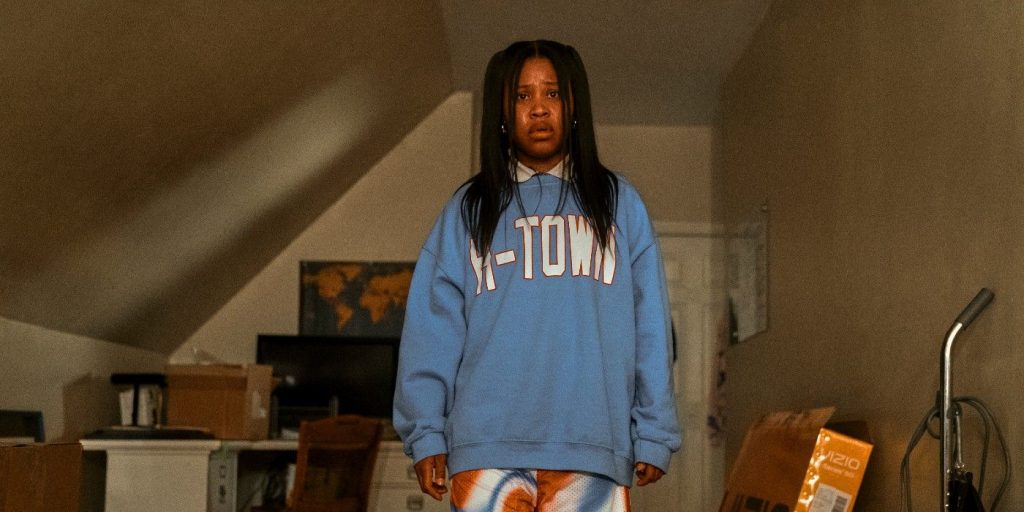Andrea Greene (In the Amazon Prime series “Swarm,” the character) blurs the lines between fiction and reality, captivating audiences with her chillingly believable story. Created by Donald Glover and Janine Nabers, Andrea’s character is crafted through extensive research that intertwines real-life events with the dark aspects of fandom culture.
As viewers delve into Dre’s obsessive world, they find themselves questioning the authenticity of her actions and the narrative itself. This intriguing blend of reality and fiction makes Andrea Greene a character who feels disturbingly real, inviting discussions about the nature of obsession and its consequences in today’s society.
Table of Contents
The Premise of Swarm and Its Main Character
“Swarm” follows the story of Dre, whose obsession with pop star Ni’Jah spirals into dangerous territory. Dre, portrayed by Dominique Fishback, embodies the character Andrea Greene, a fan so devoted that she resorts to extreme measures.
Throughout the series, viewers witness Dre’s descent into madness, driven by a toxic fan culture. As Dre’s fixation deepens, her actions become increasingly erratic and violent, reflecting the show’s eerie and suspenseful tone. With each episode, “Swarm” delves deeper into the dark side of fandom, making Andrea Greene a compelling yet unsettling main character.
The Inspiration Behind Andrea Greene Character

Donald Glover and Janine Nabers drew inspiration for Andrea Greene from multiple real-life incidents and cultural phenomena. They meticulously researched events that mirrored Dre’s obsessive behavior, diving into the dark aspects of fandom culture.
By incorporating these true elements, the creators aimed to make Andrea Greene feel disturbingly authentic. Her character is a composite of extreme fan actions observed in reality, which enhances the show’s eerie authenticity. This meticulous crafting ensures Andrea resonates with viewers, making her a compelling focal point. Through Andrea, “Swarm” offers a chilling exploration of how fan obsession can spiral out of control.
Toxic Fan Culture as the Show Backdrop
Toxic fan culture forms the sinister backdrop for “Swarm,” magnifying Andrea Greene’s chilling journey. The show plunges into the dangerous depths of extreme fandom, illustrating how adoration can morph into obsession.
Through Dre’s intense fixation on Ni’Jah, viewers witness a nightmarish escalation. The narrative incorporates real-life instances of fanatical behavior, grounding the fictional Andrea Greene in unsettling reality. As Dre’s actions turn increasingly violent, “Swarm” reveals the dark side of unwavering devotion. The creators shine a light on the potential perils of idolizing public figures, making the story resonate deeply with today’s audience.
Episode 6: The Mockumentary Approach
Episode 6 of “Swarm” takes a unique turn with its mockumentary style, presenting Andrea Greene as a real person. This approach creates an unsettlingly realistic narrative, tricking viewers into questioning the show’s authenticity.
Detective Lorretta Greene’s investigation into Andrea’s supposed murders blurs the lines between fact and fiction. The episode masterfully uses documentary techniques, such as interviews and archival footage, to delve into Dre’s backstory. This clever strategy heightens the eerie atmosphere, making Andrea’s character seem disturbingly real. As the mockumentary unfolds, it challenges viewers to discern the boundary between reality and scripted drama.
The Impact of Episode 6 on Viewer Perception
Episode 6 significantly impacts how viewers perceive the show, pushing them to question the boundaries between fiction and reality. The mockumentary format adds a layer of complexity, making Andrea Greene seem tangible.
As viewers navigate through interviews and investigative footage, they are pulled into a narrative that feels authentic. This clever storytelling technique fosters a sense of unease, as fans grapple with the idea that Andrea could exist. Consequently, Episode 6 transforms “Swarm” from a mere fictional series into an unsettling exploration of reality, deeply affecting audience perception and engagement.
Andrea Greene Is Not A Real Person (But Is Based On Reality)

Andrea Greene is not a real person, but her character is grounded in reality. Donald Glover and Janine Nabers meticulously researched real-life incidents to craft Andrea’s story. By weaving factual events into the fictional narrative, they created a chillingly authentic character.
Andrea embodies the extreme behaviors observed in toxic fandoms. This blend of fiction and reality ensures her actions resonate with viewers. The show’s creators aim to highlight the dark side of fan culture. Consequently, Andrea’s character feels disturbingly plausible, making “Swarm” a compelling exploration of obsession.
Extensive Research Behind Swarm’s Storyline
Donald Glover and Janine Nabers spent months researching real-life events to shape Andrea Greene’s story in “Swarm.” They aimed to accurately depict the intensity of toxic fan culture. The creators delved into numerous incidents and cultural phenomena, ensuring her actions were grounded in reality.
This extensive research allows the storyline to feel eerily authentic. By pulling from true events, they crafted a narrative that resonates deeply with audiences. The meticulous attention to detail in their research makes her character both believable and unsettling, adding depth to the show’s exploration of fan obsession.
The Meta Element: Blurring Reality and Fiction
The meta element in “Swarm” brilliantly blurs the lines between reality and fiction. By presenting Andrea Greene through a mockumentary format, the show tricks viewers into believing in her existence. Transitioning seamlessly between scripted drama and documentary-style footage challenges the audience’s perception.
This clever narrative device enhances the eerie atmosphere, making her character disturbingly plausible. The creators use this approach to deepen the unsettling effect, encouraging viewers to question what’s real. Ultimately, this technique adds a layer of complexity, making “Swarm” an engrossing exploration of the dark side of fandom.
Real-Life Fandom Gives Swarm An Eerie Authenticity
“Swarm” taps into real-life fandom, giving the series an unsettling authenticity. Andrea Greene, though fictional, mirrors the extreme fan behaviors we’ve seen. Fans leaking addresses and sending threats are disturbingly common today.
This realism grounds Andrea’s story, making her actions plausible. The show’s creators researched toxic fandom incidents, infusing true elements into the narrative. This blend of fact and fiction heightens the eerie atmosphere, making viewers question reality. As Dre’s obsession grows, it echoes real-world events, making “Swarm” feel uncomfortably close to home. This authenticity is what makes her character so compelling and haunting.
Swarm Cautionary Tale About Fan Obsession
“Swarm” serves as a stark cautionary tale about the dangers of fan obsession. Through Andrea Greene, the series highlights how adoration can quickly turn toxic. The character’s actions mirror the extreme behaviors seen in today’s fan culture, where devotion crosses dangerous lines.
As Dre’s fixation on Ni’Jah intensifies, viewers witness the harrowing consequences of unchecked obsession. The show’s depiction of Andrea’s descent into madness underscores the perils of idolizing celebrities to an unhealthy degree. By blending reality and fiction, “Swarm” compellingly portrays the dark side of fandom, warning audiences about the potential for tragedy.
Swarm Reception and Viewer Reactions
“Swarm” has garnered mixed reactions from viewers and critics alike. Many applaud the show’s eerie authenticity, particularly the character of Andrea Greene. The mockumentary style in Episode 6 intrigued audiences, blurring reality and fiction effectively.
Fans have taken to social media, discussing the unsettling realism of Dre’s actions and their parallels to real-life fan culture. However, some critics argue that the show’s intense focus on toxic fandom can be unsettling. Despite the controversy, “Swarm” has sparked important conversations about the impact of obsessive fan behavior, making it a thought-provoking series worth watching.
